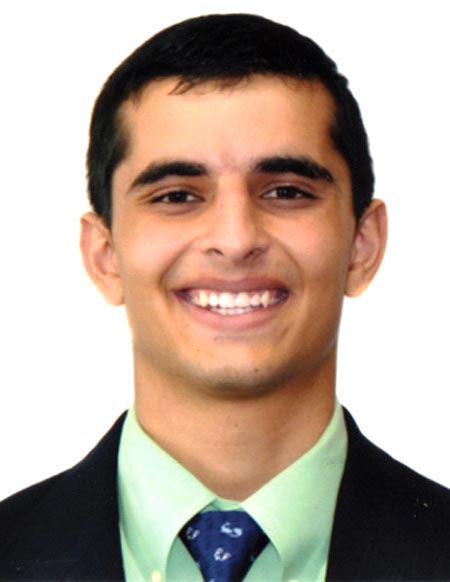
Ishan, a senior at Stanford where he will receive bachelor's degrees in economics and earth systems next year, has been frustrated with American environmental policies, particularly in terms of reducing greenhouse gas emissions. But he felt that somebody has to work to change policy.
"We need to influence them for the future of humanity and I wanted to do that," he said.
When he was in high school, thanks to a book by a MIT physicist that alerted him about environmental issues, Nath became concerned about climate change and put his energy into community activism. He took charge of his school's environmental group and implemented a variety of projects, from planting trees to installing energy-efficient lighting.
In his Rhodes Scholarship essay, he writes: Our small group of students made gradual progress, spreading awareness and raising $30,000 in grants that helped purchase the school's first solar panels. I took pride in our work, but yearned to do more... For me, this warming world conjured images of India, my birthplace, and its struggling masses already living in extreme poverty and oppressive heat. They, along with others in equatorial regions, could ill-afford another setback and I was determined to help prevent it.
Since then, Ishan has been eager to do more in terms of influencing the US policymaking in a positive way towards environment.
"If you realise that there are large challenges, it motivates you more; and that is how I have turned my frustration into passion," he said.
His senior thesis relates to clean energy and a national cap-and-trade emissions trading system. He also interned at the office of the economic policy at the White House and served as a consultant to the Department of Energy.
Given that he wants to see policy changes, should he not have been in Congress rather than in Oxford, where he will study development economics?
"I do not know how to answer that," he said. "I do not think I am cut out for electoral politics. I think I would do a better job as an economist rather than as a politician."
Ishan, a Truman Scholar and an Udall Scholar, has also been an editorial writer for The Stanford Daily and a political columnist.
Also read: The success story of an Indian who won the Rhodes scholarship
Also read: This Rhodes scholar worked as a grocery store checker
Also read: The fascinating journey of the Indian Rhodes Scholar from Mexico to Haiti

How optimistic is he about changing policies, particularly of the US, in terms of reductions of greenhouse gases after he finishes his Oxford studies?
"I think it is presumptuous to think anyone will change politics, but I think everyone hopes that his or her work will have some impact on politics and decision-making," he said.
"So it will take a lot more than a few people's hard work for American policies to change, particularly on the issue of climate change. A lot of people are already working on this and they are struggling. There are major forces working against them. But I intend to work on a broad range of economic issues relating to environment in the US and in other countries. I think climate change is a difficult political issue but hopefully progress will be made in other areas. The only thing I will like to add is that politics changes rapidly. So, the political climate for climate change in the US right now is totally different than it was in 2008 before I started my college education, and maybe in some years it will be totally different again."
He agreed that there have to be other avenues for climate change other than the United Nations Framework Convention on Climate Change.
"There are countries that are taking action on climate change," he said. "The US, of course, is lagging, behind. I think what is important is that countries must have right policies in place and that are implemented. I guess there is not one overarching solution. The keys that we need to adopt are cheaper and more reliable technologies for clean environment."
A marathon runner who will do his master's in development economics at Oxford, Ishan admitted that at times when the US economy is going through recession, environment is not on the frontburner for the people on the street.
"Climate change has been so politicised and partisan that I feel policies will not change, particularly in this situation," he said.
Ishan, who was born in Delhi and came to the US when he was 2 years old, "would really like to play basketball while I am in Oxford. It is going to be my dream come true! If I can get into the Oxford basketball team that would be awesome!"

As I thumb through the pages of The Economist or the latest popular economics text I wonder: What policies would reduce unemployment? How can some poor countries follow others that have found success? Why does America's education system fail its underserved students?
To learn and refine my views, I spent hours debating policy with professors in hopes of developing my own expertise. But making serious analytical contributions requires much more, as I learned while working for President Obama's Oil Spill Commission.
My work there covered a narrow scope -- offshore drilling liability and insurance -- but sorting through its complexity required months of extensive research before I could draw solid conclusions. Only that kind of rigour, I discovered, can discern subtle realities from ideological posturing.
Yet even the best answers to economic questions become meaningless if policy does not follow. The Commission's work languished when Congress ignored its recommendations, as did dozens of strong proposals I saw as a White House intern. Legions of economists agree, for instance, that America could revive a depressed construction industry and improve productivity by investing in its degrading infrastructure. But without Congress, this suggestion can accomplish nothing...
My undergraduate education provided a technical understanding of economics and energy, but left me curious to learn more about development...
By pursuing an MSc in Economics for Development at Oxford, I could explore a range of topics, from Xiaolan Fu's work on technological innovation to the pioneering strategies outlined in Paul Collier's Bottom Billion, before narrowing my focus later for a PhD...
But why dedicate my career to policy dependent on capricious political institutions prone, even in an advanced democracy, to ignoring science and gambling economic stability? Because policy matters on a tremendous scale.
Excerpted from Ishan Nath's Rhodes Scholarship Essay